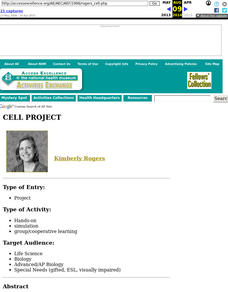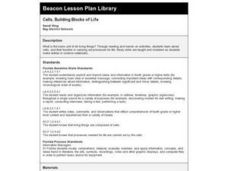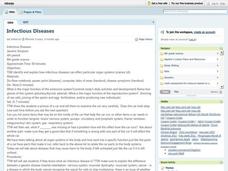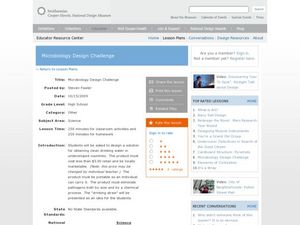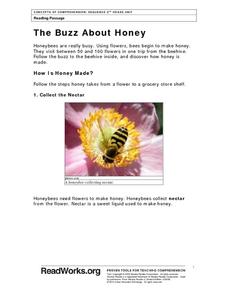Curated OER
Spotlight On Stem Cells
Learners discover the differences in how stem cells develop and function depending on their source. They see how scientists are using stem cells - from a variety of sources - to study how they can be used to cure certain illnesses and...
Curated OER
Plant and Animal Cells
Students investigate parts of a cell. In this plant cell lesson, students determine the difference between plant and animal cells. Students discover that coral is an animal based on cell characteristics. Students create puppets to...
Curated OER
Cell Project
Students investigate cells. They discover what cells are, where they are found, what they do and what they are made of. They construct a giant cell that is posted on the bulletin board.
Curated OER
The Incredible, Edible Cell
Students discover organelles and the functions organelles perform in cells. In this biology lesson, students create model cells using Jell-o, then dissect their "cell" to examine the parts that create a cell. Students create a diagram as...
Curated OER
Cells, Building Blocks of Life
Fourth graders, in groups, explore cells, the basic unit of all living things.
Curated OER
What Does Life Look Like Under a Microscope?
Students discover cells make up all living things. In this life science lesson, students investigate living organisms and the cells that create them. Finally the students create a testable question, conduct an investigation, and draw...
Curated OER
The Magic School Bus Inside Ralphie
Students learn along with Ms. Frizzle's class. In this Magic School Bus lesson plan, students discover that skin protects our bodies the way apple skin protects an apple.
EngageNY
Grade 10 ELA Module 3: Unit 1, Lesson 1
Can people live forever? Scholars ponder the answer as they analyze an excerpt from The Immortal Life of Henrietta Lacks. As readers discover Lacks' immortal cells, they discuss how the author carefully sequences, connects and unfolds...
Curated OER
Creating a Plant Cell Journal
Young scholars discover the anatomy of a plant by illustrating plant cells. In this botany lesson, students research information about plant cells and draw pictures of cells in a plant journal. Young scholars organize their...
Curated OER
The Case of Regulation in Cells
After your biologists have learned about transcription, translation, and gene regulation, they work in a small group to create a poster of a system that serves as an analogy of the gene regulation process. They share their creations with...
Curated OER
Finding and Authenticating Online Information on Global Development Issues
Students discover how to find authoritative resources. In this research skills lesson, students examine strategies for using the Internet effectively to research global development issues.
Curated OER
Understanding Alzheimer's Disease
Students examine what experts have discovered so far about Alzheimer's. They explore how the brain works, and how it changes as we age. They discover things they should do - or not do - to keep their brains healthy.
Curated OER
Shortened Shakespeare
Students discover the two main ingredients of a play: speech and actions. They then listen to a shortened version of "Macbeth" and write down one sentence to describe what is happening in each of the comic-strip cells.
Curated OER
Just Because You Cannot See It... Doesn't Mean It's Not There
Students discover bacteria which is around them by using agar over three days. In this biology lesson, students predict what they will see over the three days and then take photographs of what is actually shown. Finally, students write...
Curated OER
Infectious Diseases
Eighth graders identify and explain how infectious diseases effect organ systems. Using an analogy with automobiles and body systems, they discover how one part influences the operation of the whole. Students write paragraphs about...
Curated OER
Let's Learn About Lettuce
Students learn more about lettuce. In this agriculture lesson, students listen to their instructor lecture about the history of lettuce. Students then participate in an activity that requires them to compare and contrast iceberg lettuce...
Curated OER
Microbiology Design Challenge
High schoolers discover dangers to human health by researching what's in our drinking water. In this water purification lesson, students discuss the conditions of water in undeveloped countries and why it is unsafe to drink....
Curated OER
Motorcycles and You
Fourth graders work as a whole group to complete KWL chart on their knowledge of motorcycles. They research using a variety of materials for information and pictures of motorcycles to discuss their common features and special uses. They...
Curated OER
the Impact of the U.s. Supreme Court on High School Journalism.
Students study of the First Amendment, Tinker, Hazelwood and the Colorado Student Free Expression Law. They discuss the ramifications on the student press and recite their memorized First Amendment rights. They discover what can...
Curated OER
When Electronics Are No Longer Useful to Us: Disposing Responsibly
Students discover ways to recycle electronics. Through discussion and research, they identify ways in which electronics that are improperly disposed can be harmful to the environment. Students explore how to responsibly dispose of...
Education World
Every Day Edit - Charles R. Drew
For this everyday editing worksheet, learners correct grammatical mistakes in a short paragraph about Charles R. Drew. The errors range from punctuation, capitalization, spelling, and grammar.
Curated OER
Structure of Natural Narratives
Class pairs select a prompt from a provided list and tell (and record) their story to their partner. They then examine linguist William Labov's model for natural narratives, and apply his model to their tale. Next, class members watch...
Curated OER
The Buzz About Honey
What's the buzz these days? Learn some fun and interesting facts about honeybees with an informational reading passage, including the steps for successful pollination and honey creation.
Curated OER
Reaching Into Your Genes
Students interact with a video to explore the basis for the science of chromosomes. They perform a chromosomal analysis called a karyotype and explore how seemingly minute errors in chromosomes can lead to devastating illnesses.


